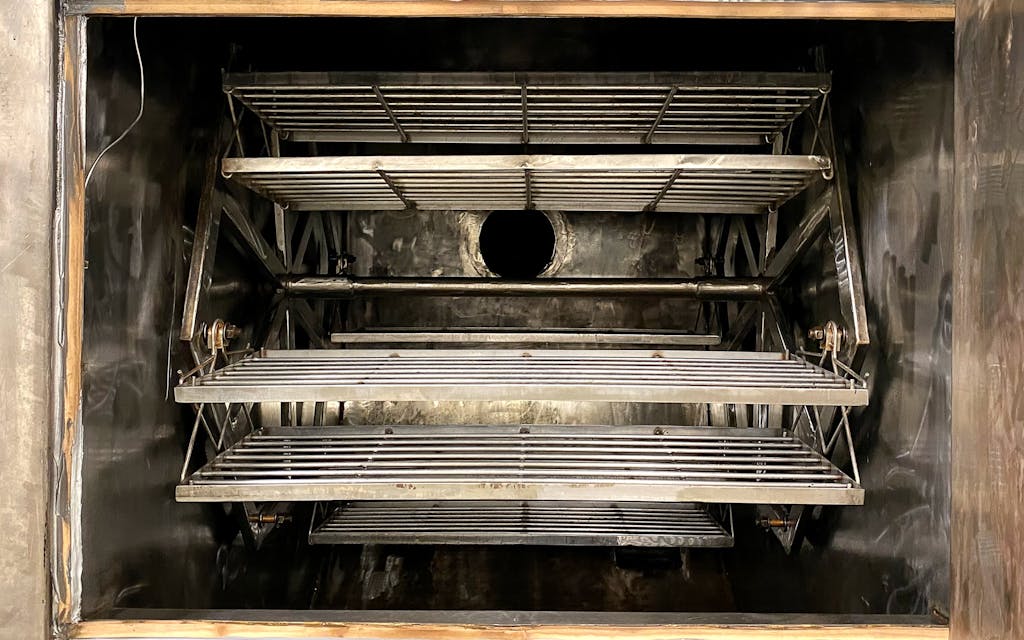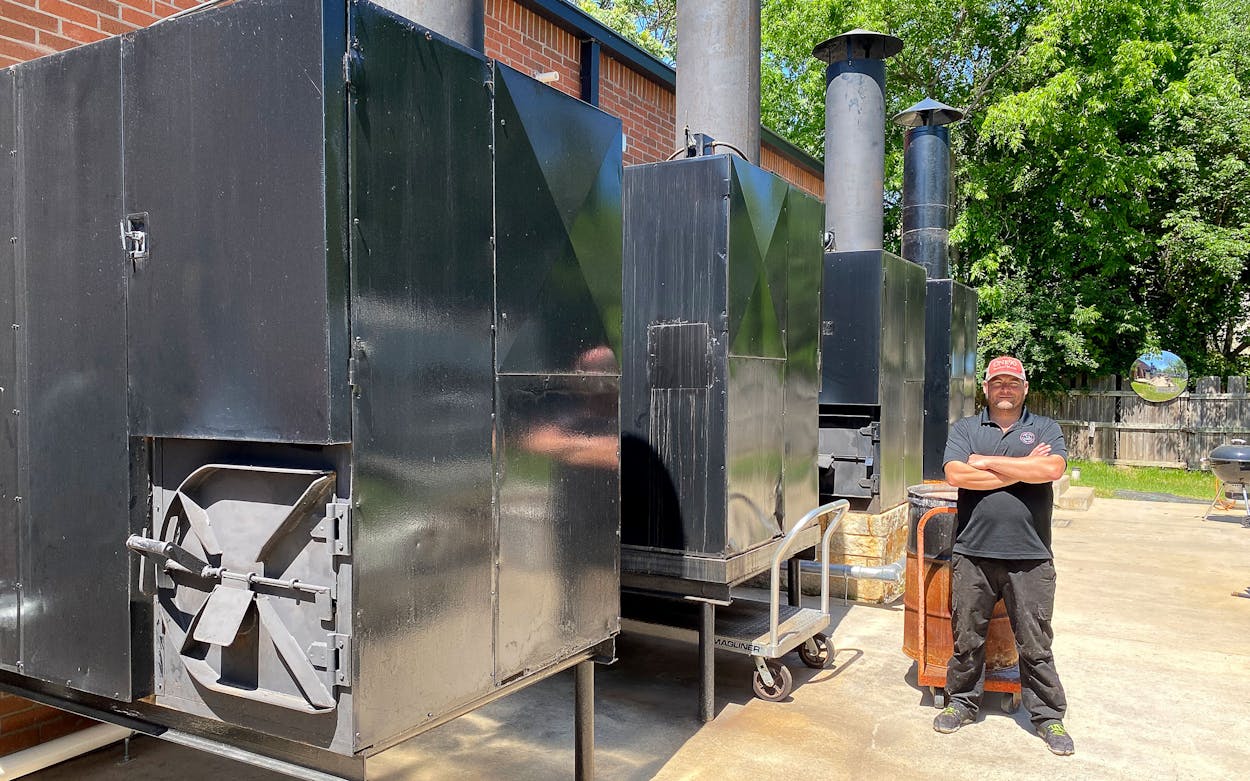Kyle St. Clair just might have the most immaculate barbecue pits in Texas. He used to think the fleet of Oyler rotisserie smokers at his One90 Smoked Meats, in Dallas, were clean, but that was before he met a USDA inspector.
While One90 mainly sells takeout sandwiches, St. Clair had to build a large kitchen to appease crowds driven to his restaurant by a Diners, Drive-Ins and Dives episode and to support a booming catering business. Once he had the off-site smokehouse humming, he figured why not package and sell his barbecue at local grocery stores? All he would need was sign-off from the USDA. How hard could it be to get the approval of the federal government?
“It was soul-crushing when [the inspector] first came,” St. Clair said. He had asked the USDA to take a preliminary look at the space in 2021 to see what issues would need to be addressed. St. Clair expected a short list. When he opened the smokers, he did so proudly, assuming what he referred to as “barbecue clean” would be enough. The grates were black and covered in a layer of grease, as is common in smokers in just about any pit room in Texas. “He wiped his finger over the rack and showed it to me. ‘That’s yesterday’s production,’ he told me,” St. Clair recalled.
He was almost afraid to ask what the standard would be during an official inspection. “You need to remove everything to the point where you can take a white glove and wipe your finger over the rack,” the inspector told him. And those inspections could happen as often as every morning. Just that hurdle, along with a signifiant checklist of other tasks, seemed impossible, so St. Clair shelved the idea for a while.
Having a USDA-inspected facility is important because of the rules governing how a business can sell prepared foods. A barbecue joint can obviously sell its barbecue at the restaurant using the permit from the local health department. Using the same permit, it can chill the barbecue and sell it in shrink-wrapped packages, which One90 has done since it opened in 2015. It can even ship you cold barbecue to reheat at home.

What it can’t do without using a USDA-certified facility is sell barbecue wholesale to any grocery store in the country. With a grocery store customer, St. Clair thought he could dramatically increase his sales volume. Thankfully, his wife, Kalenna, works for Central Market, which is H-E-B’s gourmet grocery chain, with ten locations around Texas. With some nudging from her, St. Clair refocused on the USDA checklist.
“A new buyer really wanting it and saying ‘Let’s go’ really invigorated me,” St. Clair said of Central Market’s interest. But he’d need more than some soapy rags to clean his smokers, which had been in service for years.
The oldest smoker had two decades of buildup that required complete removal. “I’ve laid in it, on both of my sides, because your arms get worn out holding a grinder with a burnishing wheel,” he said, pointing inside an empty smoker while giving me a tour of the kitchen in April. The metal gleamed; even the racks looked like they were fresh from the factory. Metal tubs big enough to hold whole hogs sat between the smokers. St. Clair designed them to submerge the racks in a heated cleaning solution to make a thorough, daily scrubbing more manageable.
As part of the required inspection, St. Clair had to build a secure office for the USDA inspector. He also swabs and tests his floor drains and food-contact surfaces. “I have to actively search my environment for listeria,” he said, which isn’t something you normally hear from a pitmaster. The effort paid off, and he was given the green light. St. Clair dropped off his first shipment to Central Market last week. In the Dallas store on Lovers Lane, where I often shop, sliced brisket and whole smoked chickens from One90 were in the cooler next to the bacon and sausage. Brisket is sold in one-pound packages for $26 each, and the chickens are $9 per pound.
The reheating instructions are simple. Call it boil in a bag, or, more accurately, simmer in a bag. If the written instructions aren’t clear enough, a QR code leads you to a video. I bought a pound of brisket—whose ingredient list comprises beef, salt, and black pepper—submerged it in a pan of 160-degree water over low heat, and retrieved it after ten minutes. The slices were juicy and tender, and they tasted just like what’s served at the restaurant.


Literally every order at the restaurant is prepared in the same simmer-in-a-bag method, so if you like the barbecue at the restaurant, then you’ll like it at home. One90 customers who get takeout from the restaurant can actually have a fresher version if they buy the brisket at the grocery store and heat it up themselves.
I’ve always liked the restaurant, which is minutes from my house, but I generally go when I want a sandwich. That’s what I made at home with my brisket, some pickles, raw onion, and barbecue sauce on a griddled brioche bun. It was impressive. My daughter, who is subjected to more barbecue leftovers than she’d like, raised her eyebrows after taking a bite. “This is good,” she said with her mouth full.
One90 isn’t the only USDA-certified barbecue producer in Texas. Two of the country’s largest barbecue producers are J Bar B Foods in Waelder and Sadler’s Smokehouse, in Henderson. You’ve likely seen their barbecue at the grocery store or inside a brisket sandwich at Arby’s or Subway. They operate on a massive scale, but St. Clair wanted to supply something not currently available in the market.
“There needs to be something on the retail side that more accurately represents the different qualities of barbecue,” he said. Craft grocery store barbecue seems an oxymoron, but St. Clair says it’s for “people who want the premium stuff, but don’t want the hoopla of going to get it,” referring to barbecue lines. Although I don’t mind lines at all, I hear from plenty of folks who do, so I’d say he’s on to something. “It’s a hunch and a gamble,” he said. If all else fails, he can produce a master class in getting a smoker spotless.
- More About:
- Dallas








